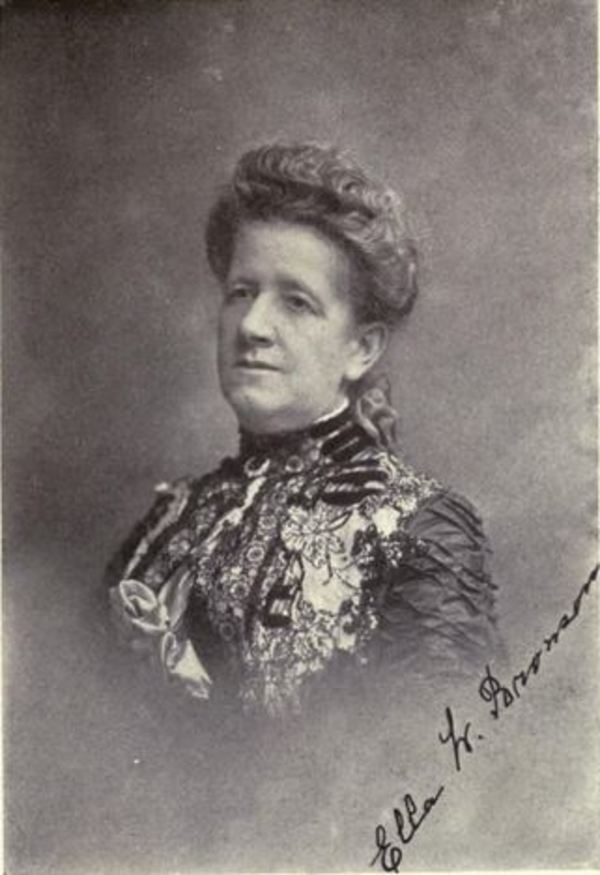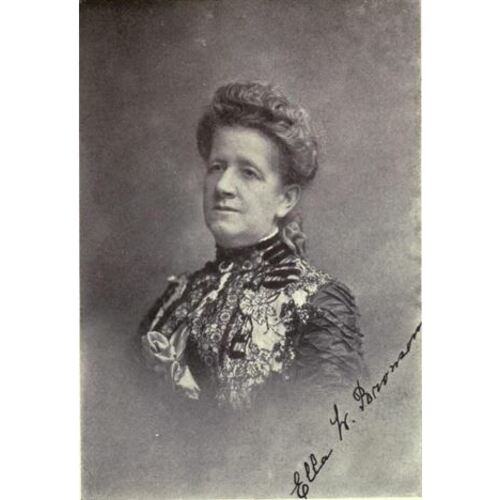
Source: Link
WEBSTER, ELLA HOBDAY (Bronson), social activist; b. 1 Sept. 1846 in Portsmouth, Va, daughter of Nathan Burnham Webster and Isabella Fish Hobday; m. 8 Sept. 1874 Erskine Henry Bronson in Norfolk, Va, and they had two sons who died as infants and a son and a daughter who survived them; d. 11 Feb. 1925 in Ottawa.
Ella Hobday Webster’s father, a cousin of the American politician Daniel Webster, was a prominent Southern American educator. Before settling in Ottawa in 1862, Nathan Burnham Webster taught at the Baptist College in Richmond, Va, served as principal of the Military Academy in Portsmouth, and founded and led the Virginia Collegiate Institute in Norfolk. He moved his family to Canada to avoid the Civil War, remaining here until 1869, when he left to establish the Webster Institute in Norfolk.
How Ella Hobday Webster met Erskine Bronson is not known. He was a member of one of Ottawa’s most distinguished families, which had made its wealth in the timber trade. After their marriage in Virginia in 1874, Erskine and Ella returned to the Canadian capital. Erskine went on to become a provincial cabinet minister in the government of Oliver Mowat*; Ella was known as a devoted, if sentimental, mother. Her public career began in earnest only after her primary domestic and child-raising duties were behind her. In 1889 she worked with Lady Macdonald [Bernard*] in planning an emigration scheme to bring female domestic servants from Britain. In 1891 she helped Lady Stanley, the wife of the governor general, to arrange some “ambulance lectures,” or first-aid courses, and between 1890 and 1892 she served on several informal committees, also with Lady Stanley, to furnish the new nurses’ institute building. She was also treasurer for funds raised to provide Ottawa soldiers with comforts during the South African War. A staunch member of St Andrew’s Presbyterian Church, she was active in its women’s missionary society and sat on a number of committees.
In 1893 Ella Bronson answered a call from Lady Aberdeen [Marjoribanks*] to help establish the National Council of Women of Canada. Although she served as a delegate to several national conventions, she was more consistently involved at the local level, where most of the council’s work was centred. Local councils were associated with the national one in a loose federation. Like the missionary societies of the churches, they educated potential female leaders such as Bronson; through them, women learned about the economic and social needs of their community and acquired a network of female contacts; they also provided a legitimate forum from which women could exercise authority and defend the Christian family as they saw it.
A vice-president of the Ottawa Local Council of Women from 1894 until 1911, Bronson served on committees to lobby for the teaching of domestic science in the city’s high schools, the creation of a free library system, and the establishment of cottages for consumptives. In 1894 she pioneered the Associated Charities of Ottawa, a scheme intended to coordinate the efforts of various agencies, set standards for recipients of charity, and provide work-placement programs for the unemployed.
The culmination of Ella Bronson’s public projects was the foundation and successful operation of the Ottawa Maternity Hospital. With Bronson as president and an all-female board of directors, the hospital opened in 1895, and it functioned until the mid 1920s, when it was absorbed into the Civic Hospital. Much of its funding was raised by Bronson through her contacts in the elites of government and the lumber industry, and she served as its president for nearly 30 years. Fashioned on a new, medical, model of hospital, the Ottawa Maternity Hospital provided obstetrical services to women, most of whom paid a small fee. It eschewed any religious agenda, although it accepted support from church groups, and did not concern itself with its patients’ moral purity as some institutions did. Professionalism was stressed, and from 1897 a three-month certification course was offered for nurses from other hospitals. They were educated in post-natal medical and nutritional care for new mothers as well as in pre-natal and obstetrical matters. By the hospital’s 25th anniversary in 1920, it had trained 600 nurses, and by its closing it had served more than 10,000 patients. On 3 Feb. 1925 Ella Bronson signed over its property to the city; she took ill the next day and died a week later.
Ella Bronson’s contribution to her community, in a private life of duty and kindness and a high-profile public career, was representative of that made by a legion of women who were intent on reshaping society. The Ottawa Journal commemorated her life of engagement when it praised her as “a notable figure, who had given her best in public service.” Her husband had predeceased her, and her estate, which was worth about $450,000, was left to family members.
AO, RG 22-354, 12212-310. Commonwealth of Virginia, Dept. of Health, Div. of vital records (Richmond), Marriage certificate, Norfolk, 8 Sept. 1874. NA, MG 9, D7-35, 113; MG 27, I, B5, 8–10; MG 28, I 32; I 37, 1–2; III 26, 719. North York Public Library (Toronto), Canadiana Coll., Ontario Geneal. Soc. Library coll., cemetery transcripts, Beechwood Cemetery (Ottawa), sect.50: 44. Ottawa Citizen, October 1899, 12 Feb. 1925. Ottawa Evening Journal, October 1896, October 1898, November 1908, May 1909, February 1910, June 1912, December 1918, November 1922, 12 Feb. 1925. Ottawa Free Press, June 1899. S. A. Cook, “A helping hand and shelter: Anglo-Protestant social service agencies in Ottawa, 1880–1910” (ma thesis, Carleton Univ., Ottawa, 1987). R. P. Gillis, “E. H. Bronson and corporate capitalism: a study in Canadian business thought and action, 1880–1910” (ma thesis, Queen’s Univ., Kingston, Ont., 1975). N. E. S. Griffiths, The splendid vision: centennial history of the National Council of Women of Canada, 1893–1993 (Ottawa, 1993). Protestant Orphans’ Home, Annual report (Ottawa), 1864–1925 (copies in City of Ottawa Arch.). [These reports reveal that secondary sources are wrong in claiming Ella Hobday Webster was known for her work with this home; it was her mother-in-law and sister-in-law who were involved in its management. s.a.c.]§.
Cite This Article
Sharon Anne Cook, “WEBSTER, ELLA HOBDAY (Bronson),” in Dictionary of Canadian Biography, vol. 15, University of Toronto/Université Laval, 2003–, accessed December 24, 2025, https://www.biographi.ca/en/bio/webster_ella_hobday_15E.html.
The citation above shows the format for footnotes and endnotes according to the Chicago manual of style (16th edition). Information to be used in other citation formats:
| Permalink: | https://www.biographi.ca/en/bio/webster_ella_hobday_15E.html |
| Author of Article: | Sharon Anne Cook |
| Title of Article: | WEBSTER, ELLA HOBDAY (Bronson) |
| Publication Name: | Dictionary of Canadian Biography, vol. 15 |
| Publisher: | University of Toronto/Université Laval |
| Year of publication: | 2005 |
| Year of revision: | 2005 |
| Access Date: | December 24, 2025 |



